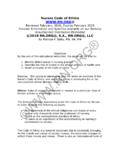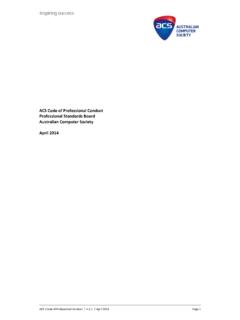Transcription of SUGGESTED LEARNING ACTIVITIES FOR COMPETENCY …
1 SUGGESTED LEARNING ACTIVITIES FOR COMPETENCY development . IN FIELD INTERNSHIPS. The following list of experiences serve as suggestions for field instructors to assign student interns and are found to be appropriate LEARNING opportunities for students in developing the 10 core social work competencies at the foundation and advanced levels. This list is intended as suggestions only, and the JMSW faculty encourage field instructors and students to be creative in providing and taking advantage of LEARNING opportunities in the field setting. COMPETENCY #1: Intern identifies as a professional social worker and conducts himself/herself accordingly.
2 Advocate for client access to needed resources. Practice self-reflection to make changes that assure continual professional development . Attend to professional roles, responsibilities, relationships, and boundaries. Demonstrate respect for clients and colleagues through appropriate professional behavior, appearance, and communication. Identify resources for engaging in career-long LEARNING . Use supervision and consultation (and field logs) to understand and identify professional strengths, limitations, and challenges. Develop, manage, and maintain clinical relationships with clients and co-workers within the person in environment and strengths perspective.
3 Readily identify as a social work professional-introduce self as clinical SW intern. COMPETENCY #2: Intern applies social work ethical principles to guide his or her professional practice. Recognize and manage personal values in a way that allows professional values to guide practice. Make ethical decisions by applying standards of the NASW code of ethics , IFSE/IASSE ethical principles, and or other social work ethical codes. Recognize and manage ambiguity in resoling ethical conflicts Apply strategies of ethical reasoning to arrive at principled decisions. Identify and use knowledge of relationship dynamics, including power differentials.
4 COMPETENCY #3: Intern applies critical thinking to inform and communicate professional judgments. Distinguish, appraise, and integrate multiple sources of knowledge, including research-based knowledge, practice wisdom, and clients' lived experience. Analyze models of assessment, prevention, intervention, and evaluation. Demonstrate effective oral and written communication in working with individuals, families, groups, organizations, communities, and colleagues. COMPETENCY #4: Intern engages diversity and difference in practice. Recognize the extent to which a culture's structures and values may oppress, marginalize, alienate, or create or enhance privilege and power.
5 Gain self-awareness to minimize the influence of personal biases and values in working with diverse groups Recognize and communicate their understanding of the importance of difference and intersectionality in shaping life experiences. View themselves as learners and engage those with whom they work as resources for information. Develop a cultural consciousness in working with diverse people. COMPETENCY #5: Intern advances human rights and social and economic justice. Understand the forms and mechanisms of oppression and discrimination. Advocate for human rights and social, environmental, and economic justice.
6 Engage in practices that advance social, environmental, and economic justice. Advocate at multiple levels to reduce patterns of social, economic, and health inequalities. COMPETENCY #6: Intern engages in research-informed practice and practice-informed research. Use practice experiences to inform scientific inquiry. Use research evidence to inform practice. COMPETENCY #7: Intern applies knowledge of human behavior and the social environment. Utilize conceptual frameworks to guide the processes of assessment, intervention, and evaluation. Critique and apply knowledge to understand persons and environments.
7 COMPETENCY #8: Intern engages in policy practice to advance social and economic well-being and to deliver effective social work services. Synthesize and differentially apply theories of human behavior and social environment to guide multicultural clinical practice. Analyze, formulate, and advocate for policies that advance social well-being, human rights and social, environmental, and economic justice. Collaborate with clients and colleagues for effective policy action. COMPETENCY #9: Intern responds to contexts that shape practice. Continuously discover, appraise, and attend to changing locales, populations, scientific and technological developments, social movements, and emerging societal trends to provide relevant services.
8 Provide leadership in promoting sustainable changes in service delivery and practice to improve the quality of social service. COMPETENCY #10: Intern engages, assesses, intervenes and evaluates with individuals, families, groups, organizations, and communities. Substantively and effectively prepare for action with individuals, families, groups, organizations, and communities. Use empathy and other interpersonal skills. Develop a mutually agreed-on focus of work and desired outcomes. Collect, organize, and interpret pertinent information at multiple system levels.
9 Assess client strengths and challenges. Develop mutually agreed-on intervention goals and objectives. Select appropriate intervention strategies with individuals, families, organizations, and communities. Initial actions to achieve organizational goals while attending to professional values and ethics . Implement prevention interventions that enhance client capacities Partner with clients in the process of finding solutions. Negotiate, mediate, and advocate for clients from an empowerment perspective Facilitate transitions and endings Critically analyze, monitor, and evaluate interventions in partnership with clients Direct Practice with Individuals, Families, and Groups Observe the field instructor or other clinical SWs conducting an interview/intake.
10 Establish supervision session time and prepare an agenda. Read and be familiar with agency policy and procedure manual. Read NASW code of ethics and agency ethical standards. Outreach to clients by telephone or in writing to set up appointments for interviews. Listen to a tape-recorded interview or lecture or watch an audiovisual presentation. Read old or current case records or agency reports. Do role-playing with the field instructor or others to try out new skills and techniques. Participate in a one-way mirror observation, either as an observer or as the subject.







